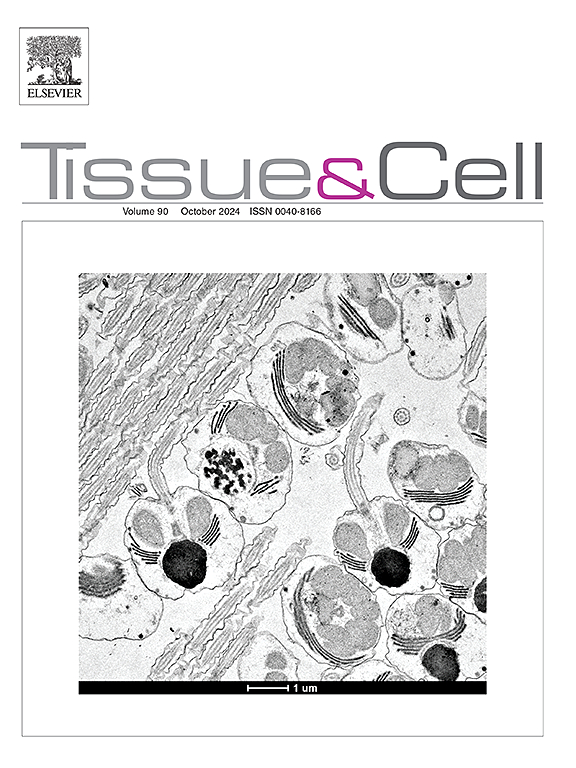Coloprotective effects of chebulic myrobalan extract by regulation of AMPK-SIRT1 signaling: A pharmacological and histopathological evaluation
IF 2.5
4区 生物学
Q1 ANATOMY & MORPHOLOGY
引用次数: 0
Abstract
Ulcerative colitis is a chronic, refractory disease caused by dysregulation of mucosal immune responses to the indigenous bacterial flora as well as genetic and environmental variables. Recently, there has been increasing interest towards the use of herbal medicines for the treatment of ulcerative colitis and the potential benefits could lie in their high patient acceptability, effectiveness, safety, and relatively low cost. It has been reported that Chebulic myrobalan (Terminalia chebula) exhibits anti-oxidant, anti-inflammatory and immunomodulatory properties. The present study was designed to evaluate the protective potential of extract of dried fruit pulp of T. chebula against Dextran sulphate sodium (DSS)-induced ulcerative colitis in male BALB/c mice. Three cycles of DSS (3 % w/v in drinking water), each followed by a seven-day remission phase were used to induce ulcerative colitis in mice. Animals were treated with T. chebula (300 mg/kg and 600 mg/kg) starting from Ist remission period to the end of the study. Different biochemical assays, histological evaluation and molecular analysis were performed to evaluate the protective effects of T. chebula extract in DSS induced colitis. T. chebula modulates the expression of nuclear factor kappa B, adenosine monophosphate kinase, tumour necrosis factor-alpha, sirtuin 1 and interleukin-1β. Furthermore, it also accorded coloprotective effects against DNA damage, apoptosis, inflammation and nitrosative stress. Finally, it was found that the high dose of the T. chebula extract (600 mg/kg) was found to be more effective than a low dose (300 mg/kg) in restoring the ulcerative colitis induced colonic damage.
诃子肉苁蓉提取物通过调节 AMPK-SIRT1 信号发挥结肠保护作用:药理学和组织病理学评估
溃疡性结肠炎是一种慢性难治性疾病,是由于粘膜对本地细菌菌群的免疫反应失调以及遗传和环境变量引起的。最近,人们对使用草药治疗溃疡性结肠炎的兴趣日益浓厚,草药的潜在优势在于患者接受度高、有效、安全且成本相对较低。有报道称,诃子肉苁蓉(Terminalia chebula)具有抗氧化、抗炎和免疫调节的特性。本研究旨在评估诃子干果肉提取物对硫酸钠右旋糖酐(DSS)诱导的雄性 BALB/c 小鼠溃疡性结肠炎的保护潜力。用三个周期的右旋糖酐硫酸钠(在饮用水中的浓度为 3 % w/v)诱导小鼠患上溃疡性结肠炎,每个周期后有七天的缓解期。从第一个缓解期开始到研究结束,小鼠分别接受了300毫克/千克和600毫克/千克的星云草治疗。研究人员进行了不同的生化测定、组织学评价和分子分析,以评估星云树提取物对DSS诱导的结肠炎的保护作用。星云树提取物能调节核因子卡巴B、单磷酸腺苷激酶、肿瘤坏死因子-α、sirtuin 1和白细胞介素-1β的表达。此外,它还具有保护结肠免受 DNA 损伤、细胞凋亡、炎症和亚硝酸应激的作用。最后,研究发现,在恢复溃疡性结肠炎引起的结肠损伤方面,高剂量(600 毫克/千克)比低剂量(300 毫克/千克)更有效。
本文章由计算机程序翻译,如有差异,请以英文原文为准。
求助全文
约1分钟内获得全文
求助全文
来源期刊

Tissue & cell
医学-解剖学与形态学
CiteScore
3.90
自引率
0.00%
发文量
234
期刊介绍:
Tissue and Cell is devoted to original research on the organization of cells, subcellular and extracellular components at all levels, including the grouping and interrelations of cells in tissues and organs. The journal encourages submission of ultrastructural studies that provide novel insights into structure, function and physiology of cells and tissues, in health and disease. Bioengineering and stem cells studies focused on the description of morphological and/or histological data are also welcomed.
Studies investigating the effect of compounds and/or substances on structure of cells and tissues are generally outside the scope of this journal. For consideration, studies should contain a clear rationale on the use of (a) given substance(s), have a compelling morphological and structural focus and present novel incremental findings from previous literature.
 求助内容:
求助内容: 应助结果提醒方式:
应助结果提醒方式:


